#become chronic
Text
sick of this anti-aging obsession. let's go in the opposite direction. i want more characters who are hardened & grizzled & have a face lined with the harrowing tribulations of time--and then halfway through the narrative u find out they're 27
#they aren't even a chainsmoker or anything they just don't wear sunscreen are chronically dehydrated and have witnessed the Horrors#u know. like most of us#ideally we first meet them in a bar where they are guzzling from a tankard like a mysterious and dangerous stranger#later we find out it's not ale they're on a kombucha kick#they've been making it in their basement w/ the help of a college roommate who quit a biochemistry phd to become a beekeeper
27K notes
·
View notes
Text
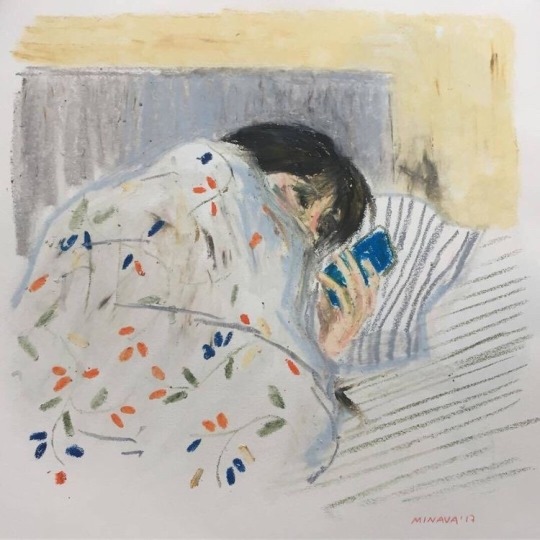


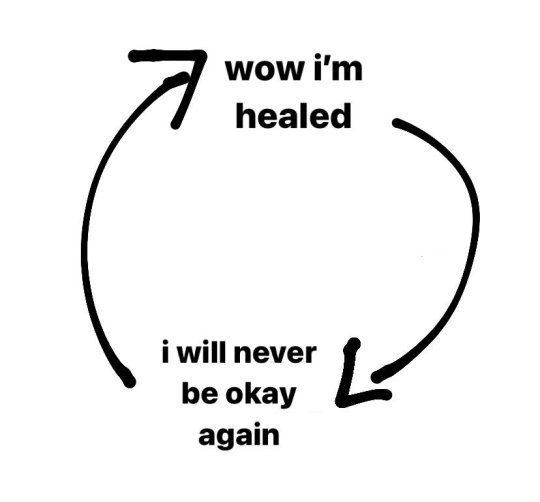

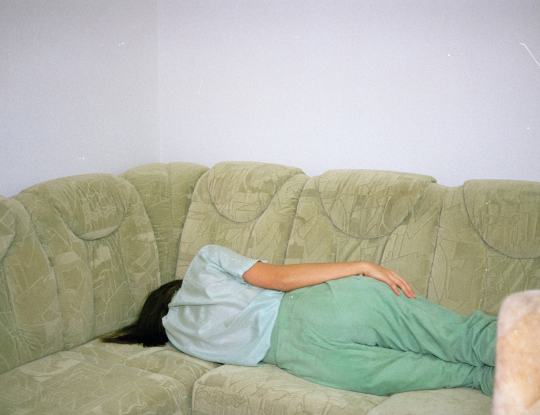


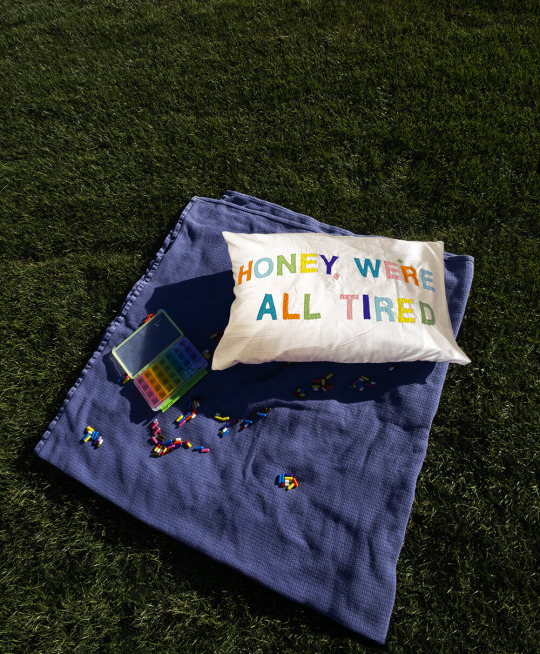

@mnvart // Kaveh Akbar, 'Calling A Wolf A Wolf' // @PinkRangerLB on Twitter // @kosmogrl // @devinsturk, '15 Proverbs for the Fellow Chronically Ill' // Jasmine Deporta // Anaïs Nin, House of Incest // the gentle wisdom uquiz by @inkskinned // Rora Blue, 'Sweet Dreams' // Hala Alyan, Dear Layal
#web weaving#webs#mine#theme: sickness#theme: sleep#theme: this is me trying#theme: i have no choice but to live with this#so. i havent made any webs in a while#ive been working full time and really struggling; turns out my thyroid has become unbalanced again#in addition to the cfs which has been actively ruining my life for eight years now#and this is how i feel about it. basically.#tw chronic illness#@mnvart#minava#kaveh akbar#twitter#@kosmogrl#@devinsturk#jasmine deporta#anais nin#@inkskinned#rora blue#hala alyan#chronic fatigue syndrome#myalgic encephalomyelitis
10K notes
·
View notes
Text
The narrative that “you should care about disabled people because one day that’ll be you” is ableist in and of itself.
You should care about disabled people’s rights because you should care about the disenfranchisement of a marginalized community.
Becoming disabled is not a punishment. Becoming disabled is not a threat. Becoming disabled is not cosmic retaliation for being ableist. Becoming disabled is morally neutral.
#disability#disabled#cripple punk#cripplepunk#disabled pride#disabled pride month#chronically couchbound#disability pride#disability pride month#disabled joy#disabled liberation#disabilties#becoming disabled#accessibility#anti ableism#ableist bullshit#ableism#fuck ableists#abledsareweird#ableist tw#ableist people#ableism cw#ableist nonsense#ableist society#ableist tropes#stop being ableist#ableists dni#disability theory#disability studies#social model of disability
4K notes
·
View notes
Text

chronic pain
#ashton greymoore#critical role fanart#bells hells#gesture drawing#Ashton having real visible cracks coming from his head and chronic pain can actually be something so dear to me#-a person with chronic headaches and migraines who also feels like their skull is a brittle stone being picked at with hammer and chisel#Is Ash gonna become my my new projection blorbo like Caleb was a couple years back? Tune in next time to see..#Would make sense honestly tho cause trauma was my biggest issue back then and chronic pain is now so....#annathenewt art#my art#critrole
4K notes
·
View notes
Text
You know the dehydration was bad the moment you get some electrolytes in your system, and it feels like a hit from party drugs.
Like yeaaaah. feeling crazy. Might fuck around and sit up in bed for 20 minutes. Life on the edge (of syncope), baby!
#chronic health tag#I'm a wreck lmao#the more aware I become#the more I'm like yeah#yesterday was a hospital day#my bad
716 notes
·
View notes
Text
i love how sometimes, despite all the medical advancements of the 21st century, the only thing that relieves pain is sitting/laying/standing in a weird position because it places/doesn't place pressure on certain spots
#i spent the last 30 to 60 min with my face planted on to my bed to help the migraine go away#it worked and my back got a nice stretch as well#sometimes the solution is becoming a frog and i love that#chronic illness#chronic pain is a bitch#chronic life#chronic pain#chronic fatigue#chronically ill#invisible disability#disabled#disability#disbaled#physical disability#disabilties#cpunk#physically disabled#cripplepunk#queer cripple#cripple punk#crip punk#cripple shit#cripple life#cripple posting#cripple problems#c punk#pots syndrome#pots awareness#potsie#chronic disability
241 notes
·
View notes
Text
every once in a while im like well maybe im not actually that disabled . and then i see someone stand for more than a minute without any pain or even discomfort n it’s like oh. nevermind 👍
#my brother playing video games standing up is BAFFLING to me#my motto since becoming disabled has been why do something standing up if u could do it sitting down👍#chronic pain#chronic fatigue#disabled#disability#0
321 notes
·
View notes
Text
god save me from the dumb shit i say when hit with brain fog
#ceo of putting my foot in my mouth repeatedly because everything is so hazy with fatigue that idk what the fuck is going on#i have been getting less than 5 hours of sleep every night for like a week#this is reaffirming my urge to run to the woods and become a hermit#spoonie#chronic pain#chronic illness#chronic fatigue#fatigue#fibromyalgia#fibro#fibro flare#c punk#cripple punk#brain fog#disabled#disability#actually disabled#fibro fog
442 notes
·
View notes
Note
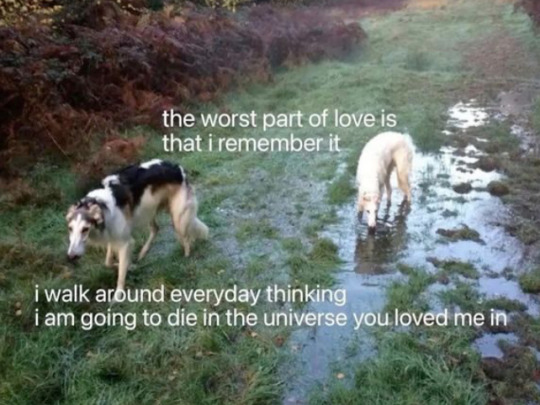
I was on Pinterest this morning and I saw this and went “MACHETE wait- he wouldn’t drink from a puddle even in an apocalypse” then I’m like- apocalypse machete wouldn’t last five minutes, he’d cringe at the thought of mud getting on his heels(tm) and Vasco would probably act like a hunting dog, he might do pretty well ina full on apocalypse or war or something, and he would carry machete over all the mud puddles Q^Q
.
#apocalypse Machete#I think that could go two ways#either he'd lose hope and ability to function and just disintegrate#or his overt cautiousness planning and orderliness would carry him surprisingly far#anxiety makes you worry about everything and sometimes imagining the worst scenarios in your head#can help you to prevent them from actually happening#he's chronically fatiqued and achy and that could hinder him but I don't think any of his conditions are acutely life threatening#Vasco would either power through with the same optimism he always exhibits#or alternatively having to struggle to stay alive and continuously losing things dear to him could eventually get to him#and he'd lose his spark and become apathetic and bitter#answered#odi-the-oddity#Vaschete scenarios
305 notes
·
View notes
Text
Help a Black Disabled Lesbian out of debt for Black History Month!
In the past month(s) ive had to max out my credit card to survive and now my monthly payments are $492. Due to disability I have limited/no income at the present and jobs are not clamoring to hire a visibly disabled Black person. I am in the long process of training a service dog so I CAN work a traditional job in the future but for now I need support. If you can pls support n share this around.
Happy Black History Month!
CA: $sleepyhen
VN: wildwotko
DM 4 P@ypal
#black history#black history month#bhm#spoonie#chronically ill#black lesbian#im in debt bc i cant work and never get my c funding goals met#so pls help me if u can! im in pretty deep debt and its becoming overwhelming
307 notes
·
View notes
Text
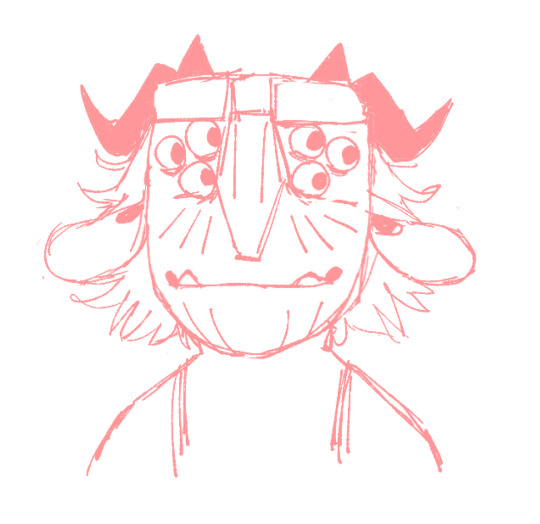

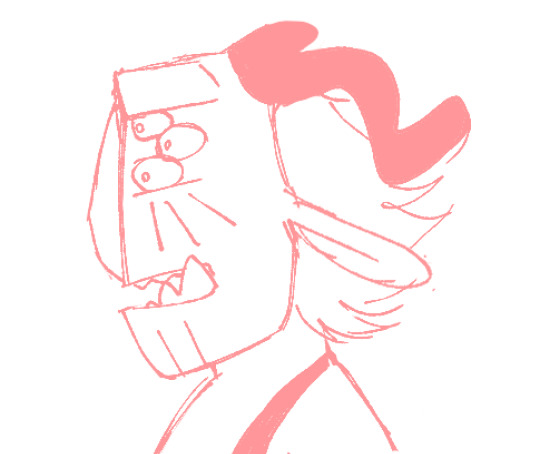
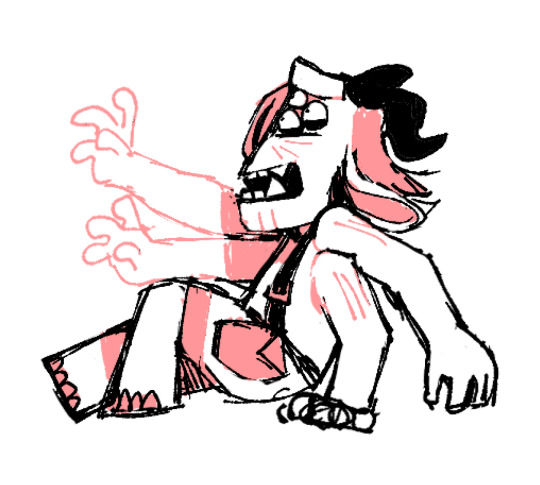
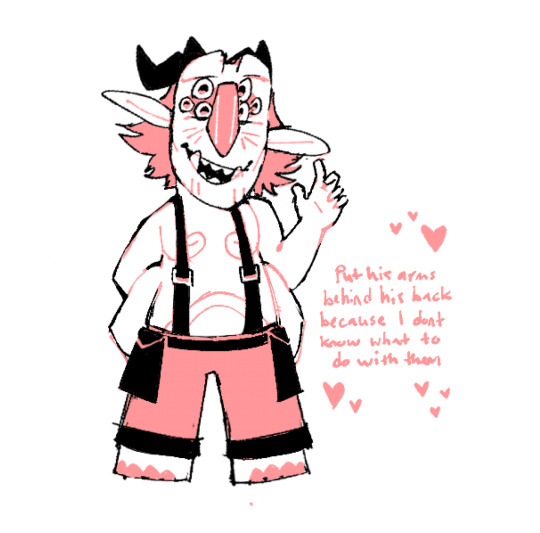
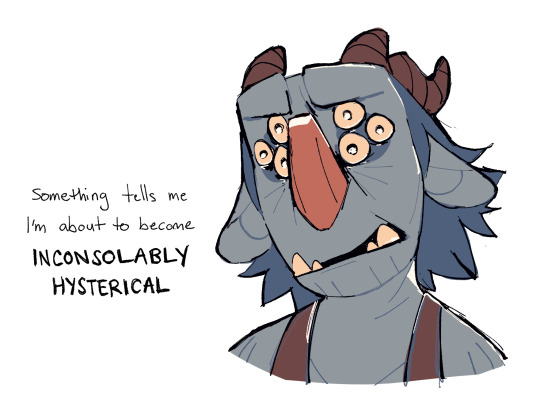

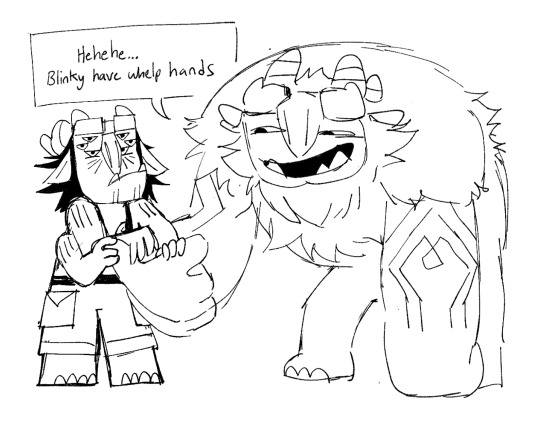
BLINKY BLINKY BLINKY BLINKY BLINKY BLINKY BLINKY BLI
#hellooo trollhunters fandom#blinkous galadrigal#trollhunters#aaarrrgghh#blinky x aaarrrgghh#[small dosage]#no that's not tumblr compression that's just me being stupid#I'VE BEEN MASS-LIKING TROLLHUNTERS STUFF WITH BLINKY THIS MAN IS THE ONLY THING ON MY MIND#the improvement between all of these sketches is so noticeable-#I love and hate it#this close to drawing him with a tail#he has chronic “man who can only express confusion or shock or anger” syndrome which is exactly my type HELP MEEEE#I LOVE WRITING HIS DIALOGUE TOO#It's like a challenge for myself to see how verbose I can put the simplest of sentences#like it wouldn't be “hi aaarrrgghh” it would be “salutations my dear friend"#it's not “have a mental breakdown” it's “become inconsolably hysterical”#he's so fun#posting this before I gotta do the truckload of homework I've been putting off 🫠🫡
209 notes
·
View notes
Text
To people of loved ones with poor memory:
It might be frustrating when they forget something (especially if it's important), but I can guarantee you that they are already beating themself up over having forgotten yet another thing. You don't need to rub that shame, embarrassment, and humiliation in deeper than it already is.
It is scary to forget things. It's humiliating to be told that the only reason we forget things is because we think nothing is important, that we're selfish and callous. Our brains are being pulled in every direction at the same time. It's impossible to keep track of this shit every picosecond of the day.
People like to conceptualize memory issues as a matter of lesser intelligence, that we're too stupid to even remember [minor detail]. I've noticed, though, that all of our brain power is kept toward other things - keeping ourselves alive, remembering a different thing, trying to regulate emotions or other disorders. Nobody seems to care that our workload is at least twice that of the "average" person's, I guess because they often don't directly notice it, or it doesn't directly affect them?
It's fine to be upset about the situation. You can't help that reaction, but you do not have to be cruel to people with memory issues, no matter the cause of it. Whatever they forgot might have been important to you, but there may be other things in that person's life that required their brainpower.
#disability#memory issues#memory loss#i've noticed that with a lot of conditions and issues that people are sympathetic up until it's a long-standing or chronic problem...#...people are sympathetic if you occasionally forget your lunch at home or you forget your great-great-great aunt's maiden name...#...but when it's chronic... when you forget your name or you forget where you're going or you forget something important daily...#...it becomes a you-caused issue. when it is the occasionally ill-remembered item that's a brain fart...#...it's something you can laugh off and forget...#...but if it's chronic it ceases to be a problem that's caused by other forces but is SOLELY caused by you...#...YOU are the one who CHOSE to forget these important things...#...that's what compounds the shame and grief and self-hatred and fundamental mistrust in ourselves and the world around us
326 notes
·
View notes
Text
Whats the first thing you would do if you woke up completely healthy and abled?
#id personally go back to college and become a teacher#disability#disabled#spoonie#chronic illness#chronically ill#chronic pain#mental health#mental illness
279 notes
·
View notes
Text
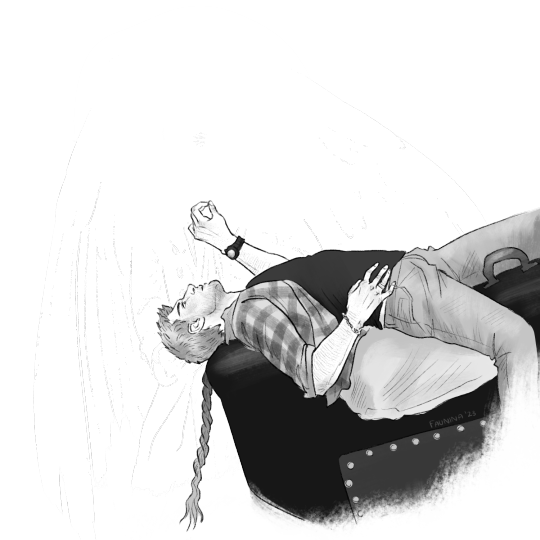
happy TWO YEAR anniversary to everyone who attended the destiel wedding!
and happy valentines day to the rest of you guys <3 click the image for a surprise!
if you’ve ever seen that one post (i’ll link it in the replies) about the parallels between the rodeo scene in 12x11 and the movie “urban cowboy” and it entirely broke your brain, then this post is for you. and also i’m kissing you on the mouth
[ID. Digital art of Dean Winchester done in black and white. He’s is laid back on top of an electric bull. One hand rests on his hip while the other hovers in mid-air, fingers slightly curled, and he seems to be looking at it. When clicked, the transparency shows Castiel standing behind him. Castiel is holding Dean’s hand to his lips, while his other hand supports the back of Dean’s head. Castiel has a visible halo and wings that he has curled protectively around Dean. End ID.]
#destiel wedding anniversary#destiel#destiel fanart#spn#spn fanart#dean winchester#castiel#ficta et picta#a personal blogging experience#PLEASE NOTE THAT THE SURPRISE ONLY WORKS IN LIGHT MODE#if you clicked the picture and nothing changed then you're using the app/website in sth other than light mode and thatll just not work sry#anyway shoutout to tumblr users nottherealdean and sagegarnish ill hopefully remember to add their post in the replies in a minute#but thanks to them i have not and WILL never be normal about that scene.#nearly TWO YEARS this concept has been swimming in my head and now FINALLY i had the skills and idea to fully COMMIT#also im ngl this is one of those pieces that i only meant to quickly sketch out and then work on later#and instead it turned into a one-time five-hour sorta hyperfocus tunnel job#and i was so IMMEDIATELY pleased with the outcome and i still am. this has absolutely become one of my favourite destiel fanart pieces#that ive ever made. <3 these idiots are ruining my life and its chronic
668 notes
·
View notes
Text
One day I will get one of those desks that rolls over your bed (as well as an adjustable bed) and I will be unstoppable

#chronic disability#chronic pain#fibromyalgia#spoonie#disability#i currently have a loft bed bc my room is tiny#which i got before becoming disabled#bc i like sleeping high up#but its hell for my joints#once i move out ill be using my bfs bed and i can get one of these desks
380 notes
·
View notes
Text
A Guide for Coming into Disability
Note: While this is meant to serve as a guide for people who are becoming physically disabled and people newly recognizing their existing experiences of disability (including chronic illness), I feel that this guide is helpful for anyone, disabled or abled. No guide is one size fits all, but I hope this can help supplement other resources that exist.
Recognizing Disability
The first aspect of coming into disability is conceptualizing what disability means for you. Some initial questions to consider are:
What is disability?
What does it mean to be disabled?
How do you identify disability in yourself or others?
Only you can define what these mean for yourself, but many definitions and models of disability exist.
Loss & Grief
As you begin to transition into a disabled body, the first sign of that change is often the experience of loss. Loss of ability, access to the world, hobbies, community, loved ones, and your sense of self are just some of the types of loss you might be experiencing. Additionally, when being a part of any marginalized community, you are now not only beginning to experience the trauma of discrimination that you’re personally facing but you are also exposed to a communal trauma of systemic marginalization.
Due to the ableist society we live in, every single person is internalizing ableism. Everything we see on the news, in movies, in classrooms, etc. is absorbed subconsciously to create a personalized narrative of the disabled experience. Weather or not that ableism is externalized doesn’t matter, because if you’re not actively dismantling internalized ableism and practing anti-ableism, then that ableism will hit you much harder when you transition into disability. The work to navigate this is constant, evolving and will change with time.
All of this is very heavy. Always unpacking, always processing, always grieving. But it does get easier to navigate, especially with the proper supports. To cope with this, I highly recommend seeking out appropriate support groups (many are online, Facebook, Discord, The Mighty are some great places to look) and considering grief counseling. Through this, remember to be gentle with yourself, cut off people if you need to, set boundaries, and do what you need to to support yourself and keep yourself safe.
Spoon Theory in Practice
A large portion of my disabled experience is simply just learning. Learning about my body, treatments, my limitations, and what I can still do. This dynamic learning often requires more language to explain complex concepts. This brings us to the spoon theory. If you don’t yet know about spoon theory, here’s the original essay by Christine Miserandino.
Spoon theory works to help explain the energy limitations of chronic illness and has been widely adopted by the greater disabled community. Essentially, it is a metaphor that uses spoons as a metric to showcase energy levels in a tangible form. Over time your spoons will change, different activities might require more or less spoons, and recharging your spoons may also evolve. This is why it’s important to use the concept of spoon theory to help you set boundaries with yourself and others.
For yourself, being able to identify your spoon levels and use them appropriately to ration energy can help you avoid falling into pitfalls like the “Boom-Bust Cycle” and better pace yourself. I put this into practice by creating lists rating activities by spoon levels. I have a master list of meals I can eat, categorized by how many spoons it usually takes to make the meal. This way, I can plan out in advance on low spoon days, like when I have PT, and know I won’t have the energy to cook a meal that takes three spoons to make, I can meal plan for the week and buy what I need for a one spoon meal that day. This can also be applied to things like chores and hobbies. I sort my to-do list by priority, and then by how many spoons it will take to do the activity. Knowing your spoon levels can assist in setting boundaries with others as well. I always have a standing appointment on Tuesdays, so I never make plans that day. I always ask for help with certain chores because even if I physically can get them done, I won’t have spoons for the rest of the day or even the week.
Accepting Disability
In order to cope with the loss of certain activities, finding accessible alternatives can go a long way. You might be able to find an adaptive way to still participate in a hobby, like adaptive basketball. There are also so many options for hobbies in the world, and you might be surprised by what works for you now! This is a good time to start to focus on what you can do, with adaptations, vs what you used to be able to/now can’t do.
Mobility aids are a beautiful tool. My advice is if you think that an aid might help you, you should at least try it! If it ends up not helping, or you don’t need it, you can always donate it. I also like to say (and my physical therapist likes to remind me) Just because you can, doesn’t mean you should.
And, of course, ask for help before your body demands it.
Disabled Liberation & Disabled Joy
If you have the spoons and time, you should prioritize learning about our history as a community (Crip Camp on Netflix is a great place to start) Additionally, you can learn about disability theory, models of disability, ugly laws, cripple punk movement, and our rights.
Disabled Joy is a concept that considers our joy to be a revolutionary act in and of itself. I use ‘joy’ here, rather than happiness, because while similar, happiness is based in the root word ‘hap’ meaning chance (as in mishap and happenstance), meaning that the experience itself is based in luck and external factors, and focus instead on the sensation associated with it– regardless of your situation, which is joy. Disabled joy looks like my partner sprinting while pushing me down the sidewalk with the wind in my face. It looks like a perfect day in Sims 4. It comes with safe foods and the healing power of accessible plauygrounds. You find it where it comes, and I hope you can find it in yourself.
Finding Community
The best part of the disabled experience, for me, is our thriving community. When it comes to community building, I always suggest online options first because they’re available 24/7 for most people, and you can reach community from your home. I’ve already mentioned online support groups, but also, online content creators are a great way to find community. If your social media following list is primarily able-bodied creators, especially ones who focus on activities that aren’t accessible to you, it can be really damaging to your mental health. This can help you to find friends who get what you're going through.
Self-advocacy and systemic advocacy resources from our peers and organizations can give you the tools and feel empowered to create change. Seeking resources by and for our community can be lifesaving. You’re reading one right now.
Welcome to the community.
♿️❤️ (wheelchair emoji, heart emoji)
#disability#chronically couchbound#cripple punk#cripplepunk#disabled#disability pride month#disabled pride#disabled pride month#disability pride#becoming disabled#newly disabled#new diagnosis#chronic illness#mobility aid#mobility aids#spoon theory#chronic disability#dynamic disability#chronically ill#bedridden#housebound#disabled liberation#disabled joy#how to cope#being disabled#hospitalization#new to disability#invisible illness#hidden disability#spoonie
266 notes
·
View notes